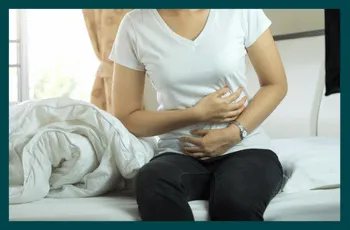What Is A ‘Stomach Bug’?
Written by the editorial staff writer at Hola. Medically Reviewed by Dr Nelson Lau, MBBS FRACGP, GP & Digital Health Specialist. Dr. Ammar AL-ANI, MBChB, CCBST, AMC. Blog updated on 09 December, 2025. Originally published on 04 January, 2024.

Contents

Overview
The term ‘stomach bug’ is commonly used in conversations to describe an onset of discomfort, in the stomach and intestines. What exactly do people mean when they refer to a ‘stomach bug’? In this article we will delve into the details of this ailment, including its symptoms, treatment options and other important factors.What is a stomach bug?
The term “stomach bug” is commonly used to refer to viral gastroenteritis, an infection that irritates the stomach and intestines. It’s very common in Australia, especially during the warmer months and early autumn. While it can leave you feeling unpleasant, it usually clears up on its own in a few days. If you’ve ever been hit with sudden nausea, dizziness, and found yourself rushing to the bathroom, you may have had a stomach bug. Let’s uncover what triggers it, the common signs to watch out for, how to care for yourself at home, and when to seek help.Causes
The most common cause of stomach illness in Australia is viral infection. Some of the key ones include:- Norovirus—the leading cause of “gastro” outbreaks and quick-spreading stomach upsets.
- Rotavirus—especially common in kids; before vaccines, it was a major reason for hospital admissions for young children.
- Adenovirus and Astrovirus—less common, but they can cause similar stomach and intestinal symptoms.
How do they spread?
- Through contaminated food and water – When the virus particles contaminate the food chain and water supply, it can easily spread to many people.
- Close contact with someone infected – The virus can spread through vomit or stool from an infected person.
- Touching contaminated objects or surfaces, then touching your face or food, increases the risk.
Symptoms
If you have a stomach bug, you might experience the following:- Nausea or vomiting
- Diarrhoea
- Stomach cramps or pain
- Mild fever or chills
- Loss of appetite
- Headache
- Muscle aches
- Fatigue or body weakness
Is a stomach bug the same as food poisoning?
The two look quite similar, but they differ. A stomach bug is caused by a virus and spreads easily from person to person. Food poisoning, on the other hand, is caused by bacteria or toxins in contaminated food. Here’s a quick comparison for better understanding:| Feature | Stomach bug | Food poisoning |
| Cause | Virus | Bacteria or toxins in contaminated food |
| Onset | 12-48 hours | 1-6 hours |
| Duration | 2-5 days | 1-2 days |
| Contagious | Yes | Usually no |
How long does a stomach bug last?
Typically:- Symptoms appear within 12 to 48 hours after infection and last about 1–3 days.
- Some people may continue to feel tired for a few more days.
- Children, older adults, and individuals with weakened immune systems may take longer to recover or have more severe symptoms.
Home treatment
-
Stay hydrated
- Drink plenty of fluids such as water, clear broths, or ice chips to stay hydrated.
- Use oral rehydration solutions such as Hydralyte (commonly available at Australian pharmacies).
- Avoid alcohol, caffeine, and sugary drinks, as these can worsen dehydration.
-
Eat light when you can
- When your appetite returns, ease back in with the BRAT diet (bananas, rice, applesauce, toast).
- Avoid fatty, spicy, or dairy-heavy meals until your stomach fully settles.
-
Rest and replenish
- Allow your body time to rest and recover. Fatigue is common.
- If you have fever or aches, over-the-counter medicines like paracetamol may help. Follow dosage guidelines.
Prevention tips
Here are a few ways to reduce your risk and protect others:- Wash your hands for at least 10 seconds with soap and water1.
- Clean and disinfect frequently touched surfaces.
- If you're sick, avoid preparing food and minimise contact with others.
- For children: keep them home for at least 48 hours after symptoms stop.
- Maintain vaccination schedules, including rotavirus protection.2
Feeling sick and unsure why? Speak with a GP online in 15 minutes.
When to see a doctor
While most cases of stomach bugs are mild and clear up on their own, you should see a doctor if:- Vomiting persists for more than 24 hours, and it’s difficult for you to keep fluids down.
- You notice blood in vomit or stool.
- You have a high fever or severe dehydration.
- Symptoms last more than 3–4 days, or you begin to feel worse instead of better.
- For children: If they show signs of dehydration (no tears while crying, very few wet nappies), see a doctor promptly.
How Hola Health can help
If you’re dealing with a stomach bug, leaving home is the last thing on your mind. With Hola Health, you can:- Speak to a qualified GP online from the comfort of your home.
- Get prescriptions sent directly to your preferred pharmacy.
- Get medical certificates if you need time off work or to support a loved one.
- Access specialist referrals if your symptoms are ongoing or worsen.
Conclusion
Stomach infections are quite common, often short-term, and generally manageable with rest, hydration, and cleanliness. However, if symptoms worsen, consult a doctor without delay. Stay well-hydrated, practise good hygiene, and track your progress—these are your most effective steps.FAQs
How long does a stomach bug usually last?
Usually, symptoms last 1–3 days, but fatigue can take a bit longer to fade.How can you tell if it’s a stomach bug or food poisoning?
Look at the cause (virus vs. contaminated food), the onset (food poisoning generally appears sooner), its contagiousness, and the duration.Can you catch a stomach bug twice?
Yes, because immunity might not last forever, different viruses can trigger similar symptoms, and protection can weaken over time.Is a stomach bug contagious? How long should I stay home?
Yes, it is very contagious. It’s better to stay home (or keep children home) for at least 48 hours after vomiting or diarrhoea has resolved. Some states have specific exclusion guidelines.What should I eat when recovering from a stomach bug?
As your appetite comes back, begin with gentle, plain foods like bananas, rice, applesauce, and toast (the BRAT diet). Avoid heavy, greasy, spicy, or dairy-rich foods until you’ve fully recovered.Feeling sick and unsure why? Speak with a GP online in 15 minutes.
What we treat
- Cough
- Nausea & vomiting
- Fever
- Hayfever
- Fatigue
- Sore throat
- Acne
- Hair loss
- Gout
- Eczema
- Rosacea
- Sunburn
- UTI
- Erectile dysfunction
- Contraception
- Morning sickness
- Morning after pill
- Prostate health
- Anxiety
- Depression
- Stress
- Grief & loss
- Antidepressants
- Premature ejaculation
- Asthma
- Blood pressure
- Blood thinners
- Diabetes
- Cholesterol
- Migraines & headaches
- Allergies
- Body ache
- Heartburn & reflux
- Sleep disorder
- Pain relief
- Gastro
Related Articles
Disclaimer
This blog is for general informational purposes only and does not indicate that Hola Health provides all treatments or preventive measures mentioned. It is not intended to be a substitute for professional medical advice. Always seek the guidance of your doctor or other qualified health professional with any questions you may have regarding your health or a medical condition. For emergencies please immediately contact 000. Any medical topics discussed are intended to educate, not to imply availability through Hola Health.
 Facebook
Facebook  X
X  Copy Link
Copy Link



